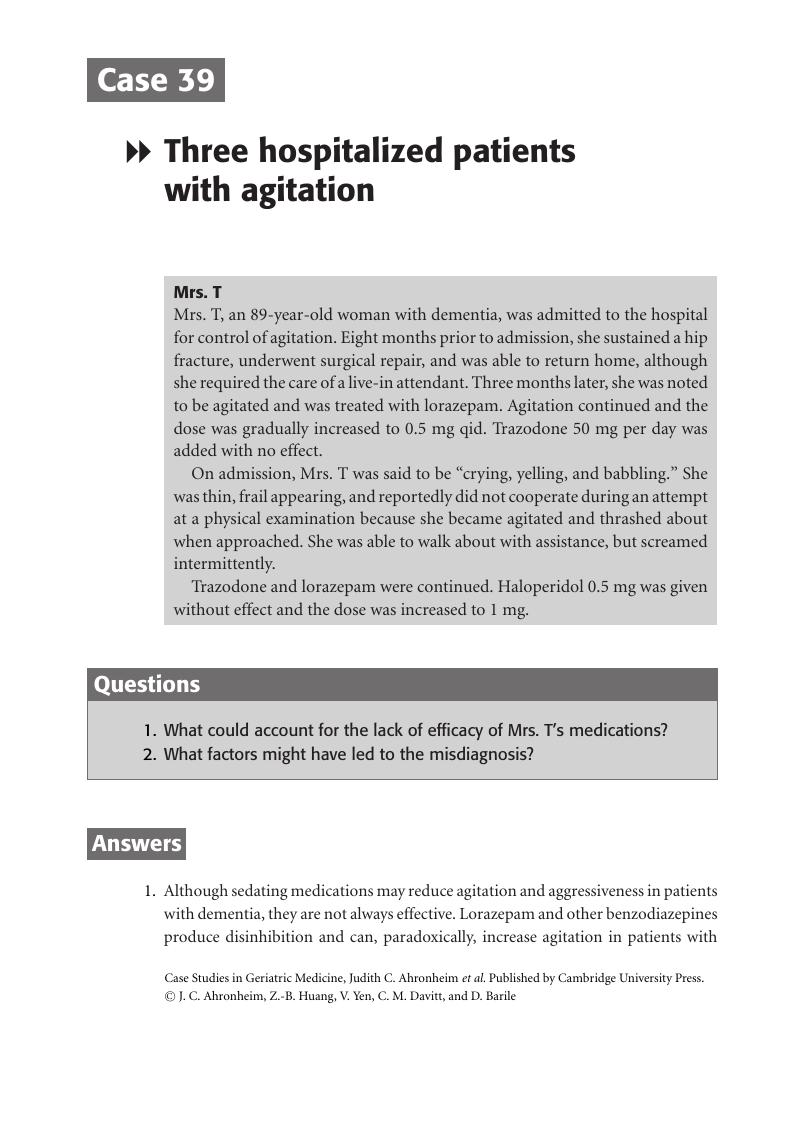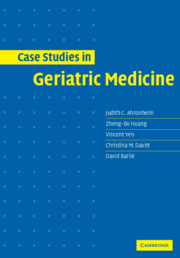Book contents
- Frontmatter
- Contents
- Preface
- 1 Annual physical
- 2 Office visit
- 3 A bad driver
- 4 Early dementia
- 5 Moderate dementia
- 6 Severe dementia
- 7 Two women with advanced dementia
- 8 Occupational deterioration
- 9 Atypical dementia
- 10 “Pseudodementia”
- 11 Chest pain
- 12 Clearance for surgery
- 13 Type 2 diabetes
- 14 Two patients with hypertension
- 15 A fall
- 16 Wheezing
- 17 Acute hemiparesis
- 18 Chronic hemiparesis
- 19 Lower gastrointestinal hemorrhage
- 20 Delirium
- 21 Herbal remedies
- 22 Insomnia
- 23 Low vision
- 24 Recurrent falls
- 25 Four patients in an osteoporosis clinic
- 26 Hip fracture
- 27 Headache
- 28 Pain
- 29 Leg ulcer
- 30 Chronic cough
- 31 Diarrhea
- 32 Upper gastrointestinal bleeding
- 33 Urinary incontinence
- 34 Urinary retention
- 35 Erectile dysfunction
- 36 Vaginal bleeding
- 37 “Mother is not herself”
- 38 “Failure to thrive”
- 39 Three hospitalized patients with agitation
- 40 Weight loss
- 41 Hypothermia
- 42 Hyperthermia
- 43 A centenarian
- Index
- References
39 - Three hospitalized patients with agitation
Published online by Cambridge University Press: 06 December 2010
- Frontmatter
- Contents
- Preface
- 1 Annual physical
- 2 Office visit
- 3 A bad driver
- 4 Early dementia
- 5 Moderate dementia
- 6 Severe dementia
- 7 Two women with advanced dementia
- 8 Occupational deterioration
- 9 Atypical dementia
- 10 “Pseudodementia”
- 11 Chest pain
- 12 Clearance for surgery
- 13 Type 2 diabetes
- 14 Two patients with hypertension
- 15 A fall
- 16 Wheezing
- 17 Acute hemiparesis
- 18 Chronic hemiparesis
- 19 Lower gastrointestinal hemorrhage
- 20 Delirium
- 21 Herbal remedies
- 22 Insomnia
- 23 Low vision
- 24 Recurrent falls
- 25 Four patients in an osteoporosis clinic
- 26 Hip fracture
- 27 Headache
- 28 Pain
- 29 Leg ulcer
- 30 Chronic cough
- 31 Diarrhea
- 32 Upper gastrointestinal bleeding
- 33 Urinary incontinence
- 34 Urinary retention
- 35 Erectile dysfunction
- 36 Vaginal bleeding
- 37 “Mother is not herself”
- 38 “Failure to thrive”
- 39 Three hospitalized patients with agitation
- 40 Weight loss
- 41 Hypothermia
- 42 Hyperthermia
- 43 A centenarian
- Index
- References
Summary

- Type
- Chapter
- Information
- Case Studies in Geriatric Medicine , pp. 255 - 259Publisher: Cambridge University PressPrint publication year: 2005



